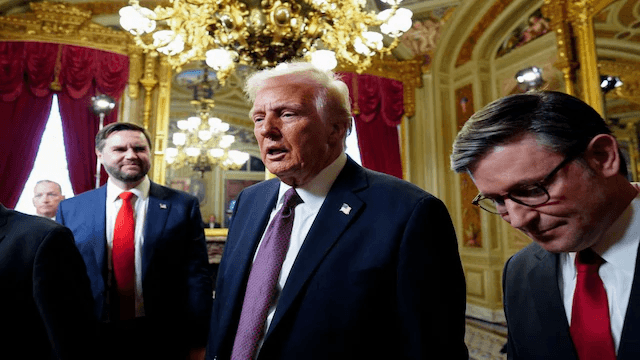In a dramatic move that has sent shockwaves across global markets, former U.S. President Donald Trump has announced a sweeping new wave of tariffs on imports from China and Mexico, claiming that both nations “owe the U.S. a lot of money.” This bold economic maneuver, which could amount to over $100 billion in new tariffs, has ignited fierce debate over the future of international trade, diplomatic relations, and economic stability. But will these nations comply, or are they gearing up for a retaliatory strike that could escalate into a full-scale trade war?
A New Tariff Storm Hits the Global Economy
On February 2, 2025, Trump declared his latest economic offensive, targeting major trading partners with tariffs of up to 25% on select goods imported from China and Mexico. The move, which comes amid his renewed push for economic nationalism, aims to curb what he describes as “unfair trade practices” and “economic exploitation” by foreign governments.
“For too long, China and Mexico have taken advantage of the United States, running up massive trade deficits while failing to play fair. It’s time they pay their dues,” Trump said at a press conference in Florida.
The tariffs target a broad range of industries, including electronics, automobiles, steel, and agricultural products. The goal, Trump argues, is to bring jobs back to American soil and strengthen domestic manufacturing. However, critics warn that this move could backfire, increasing costs for American consumers and businesses while inviting retaliation from affected nations.
China’s Response: A Brewing Trade War?
China, one of the primary targets of the new tariffs, has reacted strongly. Beijing officials immediately condemned Trump’s decision, calling it “an act of economic aggression” and signaling potential countermeasures.
“The United States is once again undermining the principles of free trade. If the Trump administration does not reconsider its actions, China will be forced to respond with strong countermeasures,” said China’s Ministry of Commerce.
Possible Chinese retaliation could include imposing higher tariffs on American agricultural exports, restricting access to rare earth minerals crucial for U.S. technology industries, and slowing down the supply chain for essential goods. Given China’s pivotal role in global manufacturing, such measures could significantly disrupt markets worldwide.
Mexico Faces Economic Shockwaves
Mexico, another major trading partner facing new tariffs, has also expressed its outrage. The Mexican government has warned that Trump’s policies could hurt not only Mexico but also American businesses that rely on cross-border trade.
“The United States and Mexico have enjoyed a mutually beneficial trade relationship for decades. These tariffs threaten millions of jobs on both sides of the border and could lead to severe economic consequences,” said Mexican Foreign Minister Alejandro López.
American auto manufacturers, many of whom depend on Mexican-made components, have voiced their concerns, warning that higher costs could result in job losses and increased vehicle prices. With nearly $614 billion in goods exchanged annually between the U.S. and Mexico, any trade disruptions could have ripple effects across multiple industries.
Impact on the U.S. Economy: A Boon or a Blunder?
While Trump and his supporters argue that the tariffs will boost domestic production and job creation, economic analysts predict a more complicated outcome. The new trade barriers are expected to lead to increased consumer prices, particularly on goods such as electronics, vehicles, and household appliances.
According to the U.S. Chamber of Commerce, the tariffs could cost American consumers an additional $50 billion annually in higher prices. Moreover, retaliatory tariffs from China and Mexico could hurt key industries such as agriculture, where U.S. exports of soybeans, pork, and corn are heavily reliant on foreign markets.
“If China slaps retaliatory tariffs on American farm products, it could devastate U.S. farmers who are already struggling with rising costs and global competition,” said economic analyst Mark Henderson.
Stock Markets React Sharply
The financial markets have responded with heightened volatility. Following Trump’s announcement, the Dow Jones Industrial Average plunged by 600 points, reflecting investor fears over escalating trade tensions. The S&P 500 and Nasdaq also saw sharp declines, particularly in sectors heavily reliant on global trade.
“Investors are concerned that a full-scale trade war could slow global growth and push inflation even higher,” said Wall Street analyst Jessica Cohen. “If these tariffs remain in place long-term, we could see a downturn in business investments and corporate earnings.”
A Political Power Play?
Trump’s tariff decision is not just about economics—it’s also a political strategy as he prepares for a possible 2024 re-election bid. By emphasizing his “America First” policy, he is appealing to his base, particularly blue-collar workers in manufacturing and farming sectors who have long supported his tough stance on trade.
However, his political opponents, including Democratic leaders and even some Republicans, have criticized the move.
“Trump is playing a dangerous game with the global economy,” said Senate Majority Leader Chuck Schumer. “Instead of strengthening American industry, he’s driving up costs and putting American jobs at risk.”
What’s Next?
With tensions rising, all eyes are on China and Mexico’s next moves. If both nations impose counter-tariffs, the U.S. could face another costly trade battle similar to the one seen in 2018. Meanwhile, industries and consumers brace for the potential impact of higher costs and market instability.
The White House has signaled that Trump may be open to negotiations, but only if China and Mexico agree to “fairer trade terms.” Whether this tough stance leads to a breakthrough or a prolonged economic standoff remains to be seen.
Conclusion: The Uncertain Future of Global Trade
Trump’s $100 billion tariff war is a high-stakes gamble with unpredictable consequences. While he claims it is necessary to restore economic balance and national security, the immediate fallout suggests a bumpy road ahead for businesses, consumers, and international relations.
The world now watches to see whether China and Mexico will bend to U.S. pressure or fight back with their own economic weapons. As trade tensions escalate, one key question remains: Will Trump’s tariff war be remembered as a masterstroke of economic strategy or a costly miscalculation that shakes the foundations of global commerce?
Also Read-
2. United Airlines Flight 1382 Catches Fire During Takeoff in Houston: 104 Passengers Escape Disaster
3. Deadly Clashes in Balochistan: 41 Killed in 24 Hours – What Does This Mean for Pakistan’s Security?




















One thought on “Trump’s $100 Billion Tariff War: Will China and Mexico Pay Up or Fight Back?”